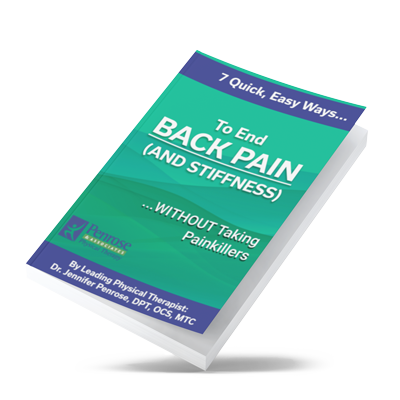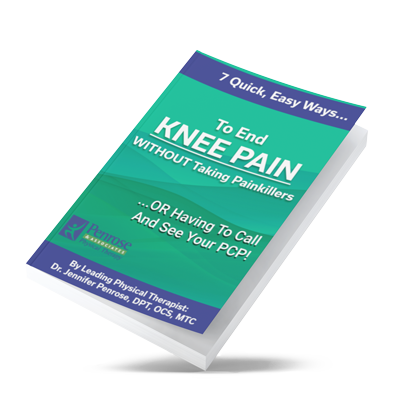Have you ever experienced knee pain? The kind that slows you down in life. It bothers you to walk up and down the stairs or hurts every time you bend down. It aches when you sit, and just generally leaves you feeling frustrated and wondering when it’s finally going to wear off… If that sounds like you, you’re not alone.
Painful knees are one of the most common things we see people living with at Penrose Physical Therapy. And a lot of people get frustrated because they don’t understand WHY it’s happening to them. Some people think knee pain is just a part of ‘getting old’, because a friend or close family member told them it happens to everyone. Some people think knee pain is one of those things that comes and goes, hoping it’ll magically disappear one day when they wake up… (but it ends up staying longer, and sometimes gets worse).
The sudden onset of knee pain can be confusing. Sometimes it happens because of a nasty fall or a movement you did that set it off. But more often than not, we see people suffering with knee pain because of everyday habits we do without even realizing. Maybe these habits are making your knee pain worse too? Here’s 3 of the most common bad habits we see people doing…
1. Wearing The Wrong Shoes.
It’s sad but true, your favorite pair of heels, or smart suit shoes, could be causing your knee pain (and making it worse). High heels change the way you walk, as do smart suit shoes that are too tight, placing additional stress on your knees. To combat this, wear shoes with cushioning. Shoes with good cushioning can absorb the impact of your foot hitting the ground, preventing the shock form getting to your knees. Specialized inserts are perfect for offering more comfort and protecting your knees. And about high heels, you don’t have to give them up altogether, save them for special occasions instead.
2. Sitting With Your Legs Bent.
There’s so much “gossip” that surrounds knee pain, but this is fact… you and I were not designed to sit. It goes against every basic, fundamental rule of the way we originally evolved as humans. When you sit at a desk, or in a chair with your knees bent underneath, you’re stretching ligaments and muscles and placing your knee in a position that is unnatural – and a position knees really aren’t built to be in for too long. Limit the amount of time you sit with your knees bent, and keep them out straight for as long as possible – and keep them moving too.
3. Taking It Easy (A Little Too Easy).
A lot of people we see think ‘rest’ is the solution to getting rid of knee pain. But when you’re told to ‘rest’, it doesn’t mean laying on the sofa watching your favorite TV series back to back all day long. IT means not doing ‘too much’. I’m not saying rest isn’t important – it is! The problem with too much rest is that it makes your joints tight and stiff. Try to do low-impact exercises that don’t put too much strain on your knees. You could go swimming, enjoy a light walk, yoga, or going for a cycle – all of these exercises are great for fitness and for your knees.
If your answer is ‘yes’ to doing any of these 3 things, putting an end to these habits today will help ease your knee pain, and stop it from getting any worse than it needs to be, or already is. There’s obviously so much more you can do too – like do exercises which have been tailored for you, and your knee pain, by a Physical Therapist, and get hands-on specialist treatment. But these are the fundamentals, if you apply them daily, you’ll feel a huge difference. That’s all from me this week, we’ll be sticking with knee pain for a while now, so stay tuned for more on knee pain next week. Until then, have a great week and enjoy the summer!
P.S.
If you want to hear more healthy tips from Dr. Penrose, tune into her monthly podcast “Stay Healthy South Sound” on iTunes, Google Play or Spotify. Check below for this month’s links!
This month, Dr. Jennifer Penrose, DPT, OCS, MTC interviews Craig Dickson on mental health and its importance. Craig has his Masters Degree in Mental Health Counseling. He has worked with kids and adults regarding loss, negative thought patterns, anxiety, depression and troubled teens and families. We discuss what is good mental health and how all of us can practice good mental health and how to recognize when others and children are not exhibiting good mental health.
iTunes: https://podcasts.apple.com/us/podcast/stay-healthy-south-sound/id1460144640
Google Play: https://play.google.com/music/listen#/sulp
Spotify: https://open.spotify.com/show/3feMt6PJtvtDBcpqPV8xXc






